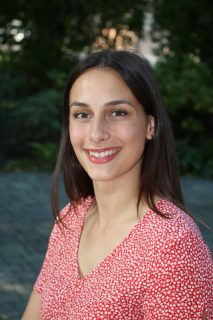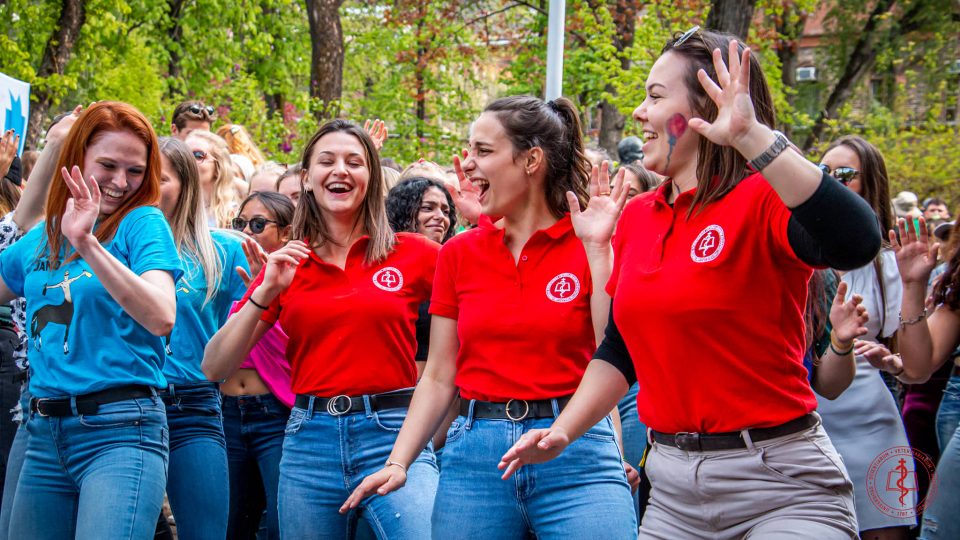The youngest of three sisters, fourth-year student Franciska Barnácz came to our University from a farming family. She knows her homeland Nyíradony and its area quite well. She utilizes her growing veterinary knowledge in taking care of their flock of “Racka” sheep. As a people person, she partakes in the organization of freshers’ camps and Equus Days, too. After obtaining her degree, she’s planning to practice in her home town where even the residents of the main street keep animals in their yards. Here’s an extract of our interview with her.
How long does the Barnácz family history date back?
We’ve traced back our family tree to the 1700s. Our ancestors moved to Nyíradony from Nagykálló. Over time, the family branched into two lines, the black Barnácz and my ancestors, the blond or blondie Barnácz…
… Who are involved in farming today.
 My parents have an agricultural company. They are involved in field crop production, contract work, drying, consulting, pesticide and seed trade. My father is an agricultural and plant protection engineer. He studied in Szarvas and then in Debrecen. My mother has an arts major, but she’s been working in our company since the farm was built. My sister Fanni is an agricultural engineer, she’s doing her MSc in agricultural economics. My other sister Fruzsina is a horticulturist and phytopathologist – they both work in the family business.
My parents have an agricultural company. They are involved in field crop production, contract work, drying, consulting, pesticide and seed trade. My father is an agricultural and plant protection engineer. He studied in Szarvas and then in Debrecen. My mother has an arts major, but she’s been working in our company since the farm was built. My sister Fanni is an agricultural engineer, she’s doing her MSc in agricultural economics. My other sister Fruzsina is a horticulturist and phytopathologist – they both work in the family business.
No animal husbandry in the family profile?
We have Racka sheep, whose primary “job” is to prevent any vegetation overgrowth on the farm. These sheep are not known for their meat yield, but their high-quality mutton is nourishing and delicious. They are excellent for our purposes, they are highly resistant.
How many animals do you have?
Usually around fifty, but, a bit out of the ordinary, we have just had nine lambs born on the farm. This is a rare thing that we may perhaps have had only once before, because Racka sheep lamb in the winter and early spring. Sheep experts told us that they went into aseasonal oestrus due to the good conditions.
How did you come to the idea that you will become a veterinarian?
I made the choice back when I was very little. I often stayed at my maternal grandmother’s, who had a lot of animals, like poultry and dogs in her back yard. I have always felt a bond with animals, and I got a chicken there to take care of. We got so used to each other that we even played on the swing together with Sergeant Pityke, as I named him after a famous Hungarian cartoon character.
Was it easy for you to get into the university?
The two advanced level secondary school leaving exams were a tough test. On the other hand, I consider myself lucky because I had known which school I wanted to attend for a long time, so I started preparing quite early. I put a lot of effort into it, I studied a lot and I managed to get in on my first attempt.
How did your family and friends react to you studying to be a vet?
Everybody’s very happy about it. Despite our town being relatively big, we have only one vet, unfortunately, and even he doesn’t live in Nyíradony anymore. He has office hours during the day only. So, they are looking forward to me coming back home.
What hardships have you experienced in your studies so far?
I had the hardest ever exam period in the last semester. I think it was because this was my first contact exam period after the Covid pandemic, and it caught me a bit unprepared. I found the pharmacology comprehensive exam to be quite difficult.
Which area of veterinary medicine are you the most interested in?
Mixed practice. I love small animals but I don’t want to work with them exclusively. I am attracted to farm work and I’m especially interested in ruminants.
Are you planning to work in veterinary care primarily?
Yes, I want to run a practice. I might also try working as an official veterinarian, because I think it would be the best way to learn the administrative tasks. I actually get some insight into the world of subsidies and refunds through observing my father’s and my sister’s consulting work. I think it’s very important for veterinarians to be well-versed in these things, especially if they work as attending vets or provide care for livestock, because many owners are unaware of the subsidies the state might give them in terms of certain vaccines and examinations.
What was your greatest experience as a university student?
The Equus Days in the previous semester. We had had two of these events cancelled due to the pandemic, so it was a fun experience when I could finally go. I had a great time.
Speaking at the semester opening ceremony, the Rector quoted a line from Noémi Madarász’ freshers’ camp invitation to emphasize how the organizers wanted to help first-year students to get the UVMB feeling. How would you characterize the UVMB feeling?
The first feeling that comes to my mind is safety. That’s what emanates from the university’s atmosphere. People are kind and smiling, I don’t feel the frustration, impersonality and alienation that my friends talk about at other universities.
What are your tasks in the student council?
I work as an organizer. Last summer I was involved in the organization of two freshers’ camps. My most serious and biggest job for the Student Council was last year’s freshers’ ball, just like this year’s event. I worked and will work as a chief organizer for both. Of course, I also contributed to the success of the Equus Days.
Did you heed the Rector’s advice that you should get familiar with Budapest and make use of the cultural opportunities offered by the capital city?
Unfortunately, I don’t know Budapest quite as much as a fourth-year student should in my opinion. I’ve been to many places, I’m not an introvert, but Covid limited our opportunities for quite some time. We couldn’t go out for a long while. Everything was closed. I travelled to Budapest for the required practical classes. When I had to go to the University for 1-2 days a week, I stayed relatively longer on campus, but when it came to the distance learning period, I spent most of my time at home. The world is just beginning to reopen now.
How do you like to spend your free time?
If the dorm room is untidy or dirty, and I have a little spare time, I’m willing to clean up. I like cleanliness. I feel good doing sports, too. I played volleyball in the team of Svetits Grammar School in Debrecen, and I carried on with this sport at the University as well. Nowadays I go to a gym, because I need the activity, but I haven’t given up on volleyball either.
What are your long-term goals?
First of all, I want to finish my paper for the Student Research Society. Under the guidance of my theme supervisor, Dr. Ádám Kerek, I run antibiotic resistance tests on chicken samples. This work is conducted as part of a comprehensive national survey. The samples come from three poultry farms in each of the seven regions of Hungary. Smearing the samples on a culture media, we isolate bacteria and determine their resistance. Later on we are going to test samples from slaughterhouses, butcher’s shops and waste water as well.
After I obtain my degree, I want to marry and have a family. As far as my career is concerned, I want to work with a veterinarian who can teach me a lot, because it will be a great help for a successful practice.
Gusztáv Balázs
